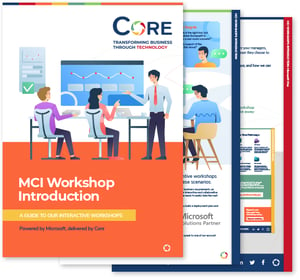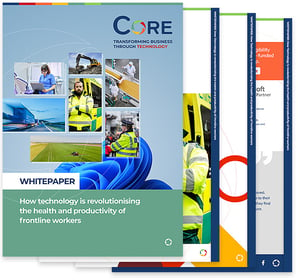Regular readers of the Core blog will know that we are heavily invested in cloud and the majority of our business is based around helping customers transition to and exist, safely and securely, within major cloud platforms.
We are a leader in helping customers overcome challenges adopting the cloud, like Identity and Access Management, which we were evangelising years before it became popular or understood as a technology in the wider marketplace. We helped the first UK government department complete a “full cloud” transition, where their entire IT infrastructure was Office 365, Dynamics 365 and Azure.
That was 5 years ago; an eon in technology terms.
We haven’t stood still, and another area where we are still trailblazing and appear to be several steps ahead of the market, is in helping customers get the best out of their cloud connectivity.
An opportunity to re-design
Customers who are transitioning into the cloud are normally doing so for a couple of consistent key reasons;
- To reduce the total costs of providing compute, storage and collaboration infrastructure. These costs are typically a combination of hardware, software, support, maintenance, power, cooling and real estate use.
- To improve operational capability through adopting cloud platforms and enabling elastic scale up and scale down, better mobile and home working, and improved service availability.
Migrating workloads into the cloud provides additional opportunities to rationalise and improve the resilience of your connectivity into your cloud platforms. If you do it right, this too can provide the two key benefits above - reduced costs and improved operational capability.
If this sounds unusual to you, I am not surprised. So many customers that we interact with have been through the 'standard' cloud transition model operated by pretty much every SI or IT consultancy in the market, going through the process of "let’s have a look at your workloads, let’s get you 'cloud ready', then we’ll migrate you, collect our payment and say goodbye"; not much original thought applied.
If connectivity is even looked at during the Cloud Readiness assessment stage, it will probably be limited to a quick calculation on the number or size of bandwidth pipe you need into your major cloud platforms, (i.e. Microsoft ExpressRoute, AWS DirectConnect), for each office location, and whether your main network gateway can work with it or not.
This is overlooking a major opportunity to improve both your ROI and your resilience from this project, especially if you have more than a handful of business locations.
Expensive connections
High bandwidth connections into major cloud platforms can be expensive, but are absolutely necessary if you have a significant number of employees, or locations, with any business dependence on any cloud platform. In a retail environment, that cloud platform could be your head office comptroller or credit card transaction authorisation / polling bureau provider, (same principle, but different connection types).
Connections like ExpressRoute or AWS DirectConnect provide a private, dedicated and consistent layer 2 or 3 connection between your office location and the cloud platform. These connections typically come with a service level agreement for availability and will support QoS; again, important if you are planning to use Skype for Business or other VoIP solutions in your organisation. They can also scale up or down dynamically without any connectivity interruption, so if you have a business with seasonal peaks and troughs, you can flex your bandwidth to suit, at least between the bookends of 50Mbps and 10Gbps per circuit, and that’s as long as your on-site network appliance is scaled to support this.
Critically, using one of these services means that all data from your users into your cloud platform, and vice versa, is handled on a private connection, not via the public internet. Customers then aren’t subject to as much latency, throttling or speed issues at busy times of the day, and your IP traffic isn’t transitioning across public circuits and infrastructure, accessible to anyone snooping around on the public net.
There is some redundancy built into each circuit to deliver the best possible reliability, but like everything else in IT, building in your own redundancy is always best practice and this is where it can start to get expensive. 2 ExpressRoute connections per branch office, (or more if you have enough employees or traffic to warrant it), plus a smattering of new network hardware to enable connection can break the business case for an Office 365 migration or push the ROI out to years rather than months – not appealing.
There is a better way
Most of our peers are able to very capably discuss the business benefits of moving to cloud, and how the underlying principles save money and improve business outcomes, yet manage not to identify that the same principles can be used for the connectivity.
This is probably why Core is consistently engaged by large customers, with incumbent global SIs, to help solve connectivity issues - so we aren’t complaining.
Our approach to this challenge is to build a cloud-based communications array, something we call Connectivity Hub. Connectivity Hub aggregates an appropriate number of suitably sized connections into co-located communication arrays, which can then connect back to the branch office locations via a range of methods such as VPN, MPLS or VPLS.
Depending on the customers SLA requirement for uptime, we will place communication arrays in 2 to 5 geographically disparate datacentre locations, with cross connections at each tier of the array, and very intelligent routing to enable resilient use of bandwidth as well as fast seamless failover in the event of any single equipment or connection failure.
Using Carrier Class networking and firewall hardware enables Core to provide a connection super-highway that can deliver higher speeds and higher resilience at a lower cost than a traditional point to point solution, with the added advantage of being able to inspect traffic from non-encrypted sources, (such as IoT sensors or some classes of mobile device), to make sure no cyber-nasties are able to penetrate your cloud repositories.
Being cloud-based itself, the Connectivity Hub is unaffected by any structural changes made to the customers organisation; it will flex as new offices open and old offices close, massively reducing costs and risks of downtime. Core’s Connectivity Hub solutions are always hosted in Tier 1 datacentres, with state-of-the-art connection and power resilience, and the highest levels of physical security. Co-location is always designed to ensure sufficient geographical disparity between sites to ensure service availability in all foreseeable scenarios.

Real-life example
As one example of the benefits of using a Connectivity Hub solution, Core worked with a customer who had a large branch network, circa 80 locations, a range of IoT and Mobile Devices and a desire to transition the majority of their physical hardware estate into the cloud by adopting Office 365 and hosting servers and storage in cloud-based platforms.
To provide the high-speed connection capability they needed at each site would have cost circa £12,000 per site per annum, with 99.9% availability SLA. The operational desire was to get at least 99.95% availability SLA which would have essentially doubled the monthly per-site cost.
Core worked with the customer to understand the workloads involved, operating hours, security requirements and organisation wide strategy for the next 5 years to develop a proposal to replace their current site upgrade plan with a truly transformational solution, a Core Connectivity Hub.
Structural cost-savings
Core was able to design, build and commission a dedicated single tenant Connectivity Hub solution for this customer, with the desired 99.95% for over £1.5m less than the cost of running the 99.9% site by site solution over 5 years.
Probably a better comparison, matched against the target 99.95% availability, the Core Connectivity Hub solution was estimated to save the customer £7m over a 5-year lifespan versus the original connection to site model.
This is without factoring in the additional benefits of deep packet inspection, improved site by site resilience, negated risk of cost of major office relocations, and the added advantage of removing the cost of developing a dedicated network solution for their IoT devices. The Core Connectivity Hub solution also includes 24x7x365 support, where the customers Site by Site option relied on their internal IT Support, which was office hours only, (and not included in the cost saving estimates).
The other major cost saving which isn’t factored into the figures above, is that the Core Connectivity Hub we designed for this customer already contains the right hardware to scale up to double their current bandwidth and connection requirement. This means that as the customers data transmission needs grow over the next few years, their cost increases will be limited to the additional bandwidth added to the dedicated high-speed connections at the top of the array.
In their original per site model, to keep costs under control the customer was looking at installing network appliances that were scaled only to the day 1 bandwidth needs. Any expansion beyond this would require either additional or replacement hardware, the latter also requiring some connectivity downtime to enable the swap out.
The customers bandwidth requirements increased in the first year of operation, which in today’s marketplace is fairly standard, but the customer also has the option to scale out to an additional location, if they reach the bandwidth capacity of the current array, so that the further expansion of the Connectivity Hub can fuel an increase in their availability SLA beyond 99.95%.
Want to know more?
If your business has transitioned, or is planning to transition to Office 365 or another similar cloud platform, and you have a large network of locations, get in touch with your industry lead at Core, who can talk to you about how we can help you improve your connection capabilities while providing a structural cost reduction for your organisation.





